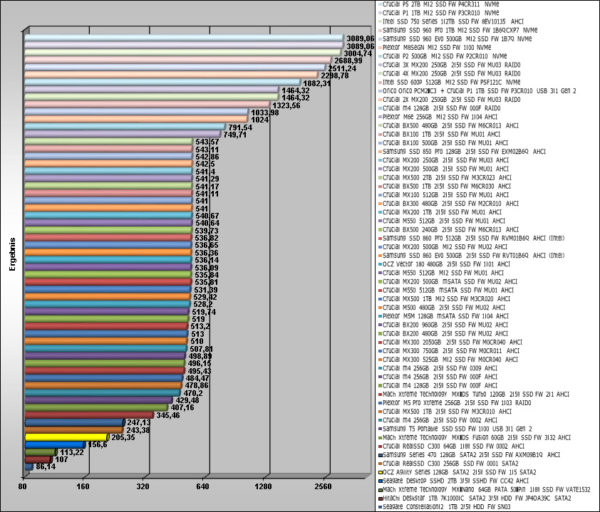
Benchmark values and test results …
Let us continue with the benchmark results. SATA3 drives are tested with an ASRock 890GX Extreme3 motherboard and test results of M.2 modules are performed using an ASRock Z97 Extreme6 motherboard. At present, Microsoft Windows 7 Ultimate Edition is used as the operating system.
PCIe SSD in practice …
Before we get to the benchmark results, we want to give you a few tips and hints for installing a PCI Express SSD because of recent events. Via e-mail and in our Hardware Forum there are frequent requests because of bad SSD speed. A PCIe SSD – both a PCIe plug-in card or the PCIe M.2 modules – require a high bandwidth for fast performance. If the Intel SSD 750, the Plextor M6e PCIe M.2 SSD or the Samsung SSD SM951 is slow, it is usually because the wrong slot is selected or the BIOS/UEFI has been set incorrectly.
We like to help you in the PC Forum under the section Hardware – easily create and write a new post, which motherboard and which PCIe M2 SSD is installed.
For the Intel 750 there is a PCIe Gen3 x4 port needed, so a PCIe 3.0 slot with at least x4 lanes is necessary to provide a bandwidth of up to 3938 MB/s. If only one PCIe 2.0 x4 slot is available, a maximum of 2000 MB/s is supported, so a slower PCIe SSD would be the result.
Here is a small chart of the PCIe speed rates:
PCIe 2.0 x1 500 MB/s
PCIe 2.0 x2 1000 MB/s
PCIe 2.0 x4 2000 MB/s
PCIe 2.0 x8 4000 MB/s
PCIe 2.0 x16 8000 MB/s
PCIe 3.0 x1 985 MB/s
PCIe 3.0 x2 1969 MB/s
PCIe 3.0 x4 3938 MB/s
PCIe 3.0 x8 7877 MB/s
PCIe 3.0 x16 15754 MB/s
The upcoming PCIe 4.0 standard starts at 1969 MB/s (all informations are maximum values without protocol overhead)
Installing Windows on the PCIe SSD …
We have checked the installation of the SSD under various test conditions, as the PCIe SSD is bootable. On the one hand we have a fresh Windows 7 x64 installation created on the PCIe SSD where you need to install a PCIe SSD driver, which can be found for example on the supplied CD. Blessed is he who still have a CD / DVD / BD drive in the PC. For Windows 8.1 x64 PCIe SSD installation there are no additional drivers needed and even the Windows 10 Pro x64 installation could be easily done on the PCIe SSD card.

Microsoft Windows 10 Pro X64 has been installed without any additional PCIe driver for the Intel 750 SSD PCIe 3.0 x4 card.
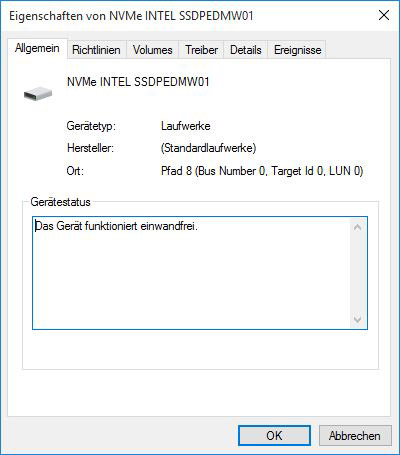
There is only one bad news: The Windows boot up time is extremely slow with the Intel 750 SSD. So the MS Windows 10 boot time was about 16 seconds, and that’s almost hard drive level! Also the Intel 750 SSD boot time with Windows 8.1 was very slow, what is apparently owed to the structure or the PCIe SSD Architecture. But you should work with this SSD and not boot 😉 In addition to that Intel seems to have recognized this problem and is probably working on a firmware update to improve the slow SSD boot speed. Therefore, now we come to the synthetic benchmark values.
The SSD drive speed was examined and compared with the following benchmark software:
AS SSD Benchmark 1.4.3704.27281 – Download
ATTO Disk Benchmark v2.46 – Download
CrystalDiskMark 3.00 – Download
HD Tach 3.040 – Download
SiSoftware Sandra 2013 – Download
AS SSD benchmark results …
The SSD benchmark values offers a very good reference point of the maximal possible reading and writing performance, the speed with smaller files and the respective access time. With the Intel 750 SSD 1200GB PCIe 3.0 x4 card we achieved incredibly high sequential read and write rates, and an extremely high 4K 64Thrd read and write speed.
The AS SSD final score is 3848 points! A Crucial BX100 500GB SSD reached 803 points in AHCI mode and a Crucial MX200 500GB SSD reached 882 points. By the way, the usable capacity of the Intel SSD 750 1.2TB PCIe SSD is exactly 1117.81 GB.
Here is a Snipping screenshot of AS SSD benchmark values:
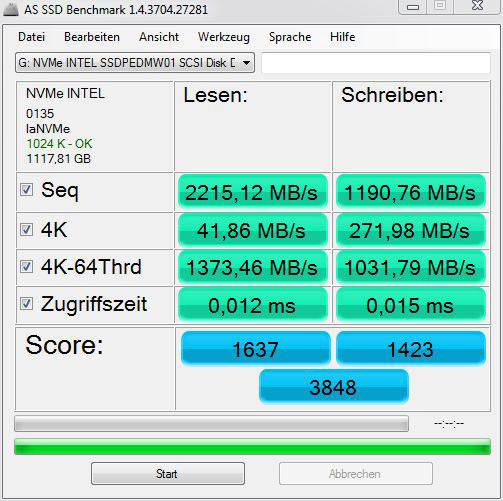
And here is yet a Snipping screenshot of AS SSD iops results:
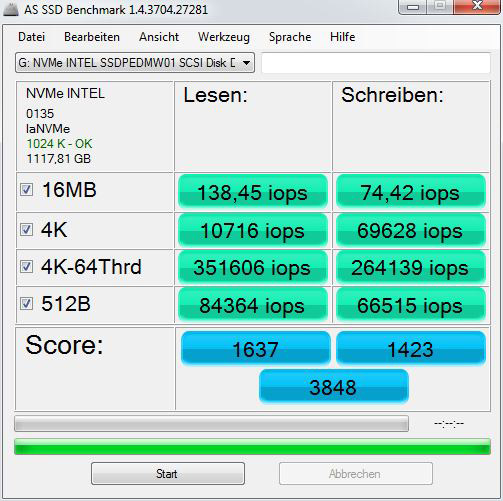
Here is a Snipping screenshot of the AS SSD copy benchmark values:
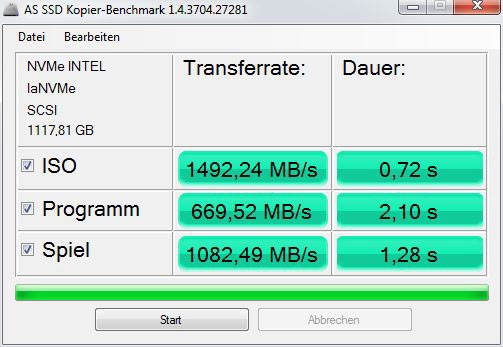
The AS SSD benchmark values should never look like this, because then the PCIe bandwidth, or the PCIe slot has been configured incorrectly (see above in the SSD too slow help):
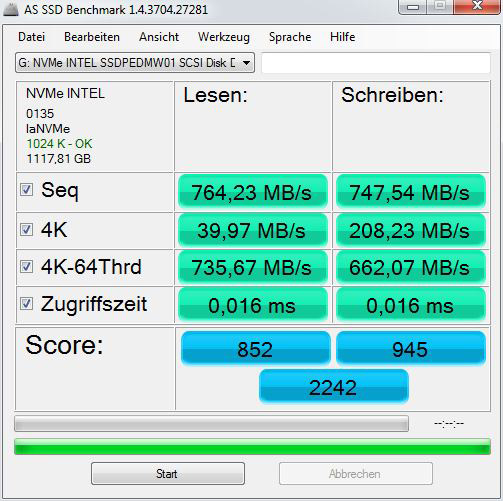
The comparison of the AS SSD benchmark results is extended with each new HDD/SSD test. Here you can see some SSDs in comparison to the Intel SSD 750 1200 GB PCIe card SSD, and the graphic will be updated periodically with new SSD drives. At the moment the top of AS SSD total score is stated absolutely clearD of this Intel SSD 750 1.2TB PCIe SSD, followed by the Plextor M6e 256 GB M.2 SSD, followed closely by the Crucial M550 512 GB mSATA and M.2 SSD. Actually, we could at this point already complete the test or comparison, because such amazing fast SSD transfer rates can not reached by conventional SATA3 SSD because they offer at least up to 6 GB/s by the SATA3 standard.
Here is a comparison of the AS SSD benchmark values, which are getting updated with new drives:
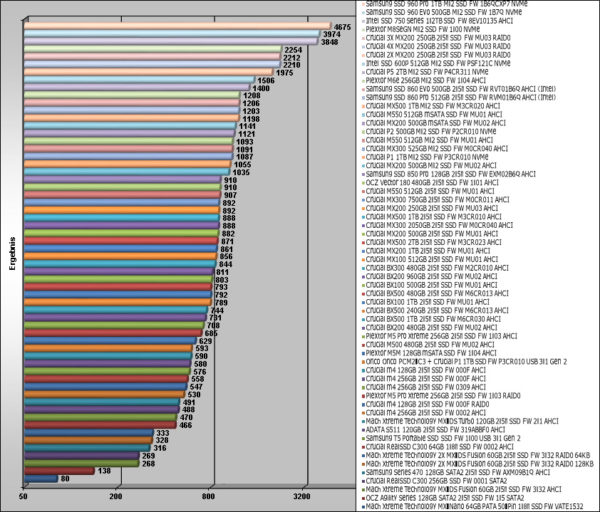
ATTO disk benchmark results …
The ATTO disk benchmark values gives a very good overview about the write and read rate on different file sizes. These values are maximum ratings, which are different to the previously continuous transfer rate benchmarks, since this benchmark may even reach a higher overall performance with slower SSDs.
At the Intel SSD 750 1.2TB PCIe SSD is the reading speed (green) from a transfer size of about 256KB higher than the write speed (red) and reaches the maximum read speed of 2684354 KB at a transfer size of 2048KB.
Here is a Snipping screenshot of the ATTO Disk benchmark values:
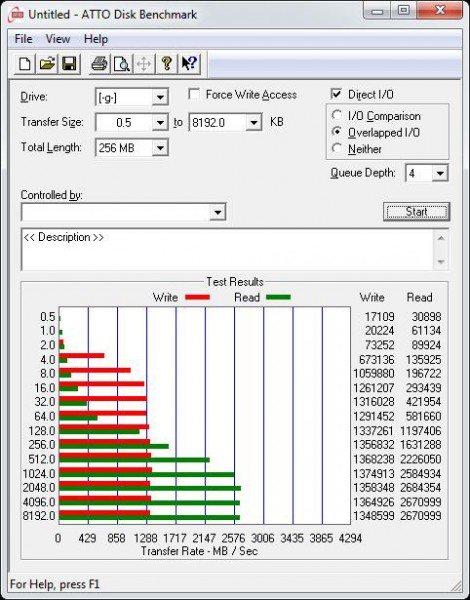
These ATTO disk benchmark values are compared with a small transfer size of 32KB and a large transfer size of 8192KB. The bar chart already includes a comparison to some SSDs and HDDs, where the Intel SSD 750 is clearly at the top of all drives.
Here is a comparison of the ATTO disk benchmark values, which are getting updated with soon coming drives:
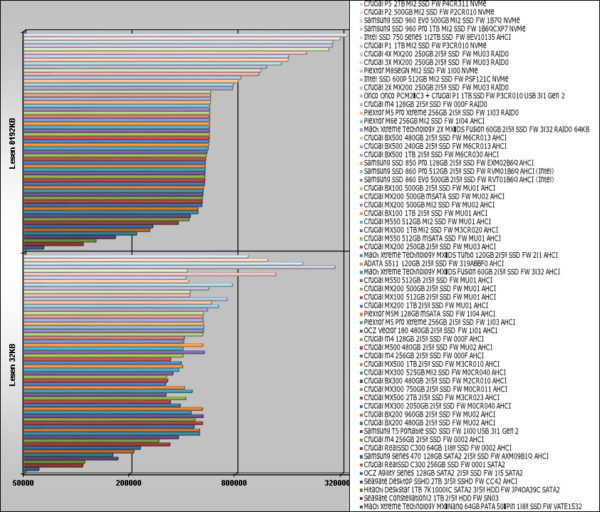
CrystalDiskMark results …
With CrystalDiskMark one receives a balanced measurement of the performance with different transfer sizes.
With CrystalDiskMark the read performance of 1675 MB/s is a bit lower than with AS SSD, but 1286 MB/s is even a new CDM write performance record.
Here is a Snipping screenshot of the CrystalDiskMark values:
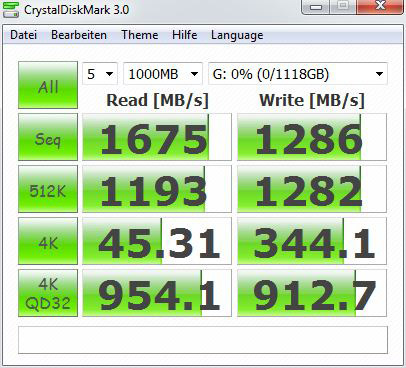
The following diagram shows the CrystalDiskMark results once again compared with other SSDs and platter drives, which are extended step by step. In the CrystalDiskMark comparison one can see significant differences between the to-date tested of the Solid State Drives and Hard Disk Drives, where the Intel SSD 750 1.2 TB SSD is clearly at the top of all results.
Here is a comparison of the CrystalDiskMark values, which are getting updated with soon coming drives:
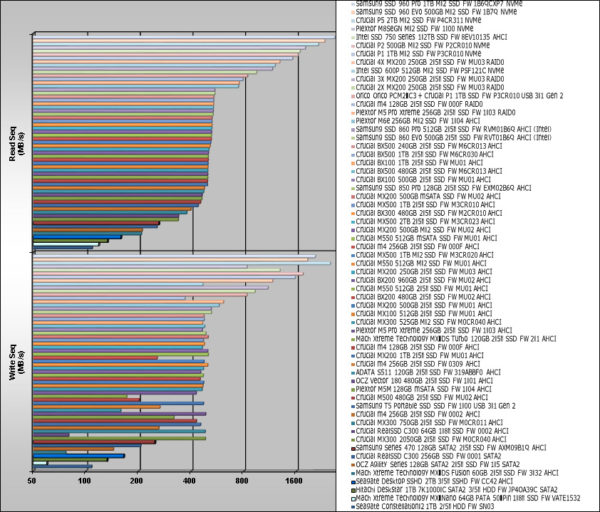
HD Tach result …
With HD Tach one can measure the gradient of the performance, but the SSD transfer is not comparable with a conventional HDD. New logical NAND cell access of the SSD controller results like some other equal designed SSDs in strong varying values with the latest HD Tach Version 3.0.4.0 version, which is written for hard disk drives.
HD Tach shows relatively constant peaks at the writing speed, and continuous transfer rates with the lowest displayed access time of 0.0ms and reading values up to 2219.1 MB/s.
To compare these results you can move the mouse over the following drives to see their respective benchmark results:
Intel SSD 750 1200GB PCIe card Gen3 x4, ADATA S511 120GB SSD at SATA3 AHCI, ADATA S511 120GB SSD at SATA3 AHCI, Crucial BX100 1TB 2.5″ SSD at SATA3 AHCI, Crucial BX100 500GB 2.5″ SSD at SATA3 AHCI, Crucial MX100 512GB 2.5″ SSD at SATA3 AHCI, Crucial MX200 1TB 2.5″ SSD at SATA3 AHCI, Crucial MX200 1TB 2.5″ SSD at SATA3 AHCI, Crucial M500 480GB 2.5″ SSD at SATA3 AHCI, Crucial M550 512GB 2.5″ SSD at SATA3 AHCI, Crucial M550 512GB M.2 SSD at SATA3 AHCI, Crucial M550 512GB mSATA SSD at SATA3 AHCI, 2x Crucial m4 128GB 2.5″ SSD at SATA3 RAID, Crucial m4 128GB 2.5″ SSD at SATA3 AHCI, Crucial m4 128GB 2.5″ SSD at SATA3, Crucial m4 256GB 2.5″ SSD FW 000F at SATA3 AHCI, Crucial m4 256GB 2.5″ SSD FW 0309 at SATA3 AHCI, Crucial m4 256GB 2.5″ SSD FW 0002 at SATA3 AHCI, Crucial m4 256GB SSD FW 0309 at SATA3 IDE, Crucial m4 256GB 2.5″ SSD FW 0002 at SATA3, Crucial C300 64GB 1,8″ SSD at SATA3, Crucial RealSSD C300 256GB 2.5″ SSD at SATA3, Crucial RealSSD C300 256GB 2.5″ SSD at SATA2, Hitachi 7K1000.C 1TB HDD, MX-DS Fusion 60GB SSD SATA3 IDE, MX-DS Fusion 60GB SSD SATA3 IDE, MX-DS Turbo 120GB SSD at SATA3 AHCI, OCZ Agility 128GB SSD, OCZ Vector 180 480GB 2.5″ SSD at SATA3 AHCI, Plextor M6e 256GB M.2 SSD PCIe AHCI, 2x Plextor M5 Pro Xtreme 256GB 2.5″ SSD at SATA3 RAID0, Plextor M5 Pro Xtreme 256GB 2.5″ SSD at SATA3 AHCI, Plextor M5M 128GB mSATA SSD at SATA3 AHCI, Samsung Series470 128GB SSD AHCI, Samsung Series470 128GB SSD Legacy IDE, Seagate Constellation.2 1TB 2.5″ HDD at SATA3, Toshiba MK8007GAH 1.8″ HDD
Here is a Snipping screenshot of the HD tach benchmark values:
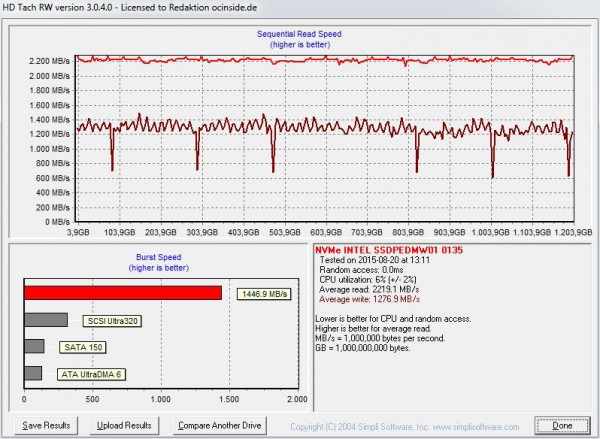
As seen in the previous benchmarks the Intel SSD 750 1.2TB PCIe SSD can take place on top of the chart again with HD Tach.
Here is an impressive comparison of the HD Tach benchmark values, which are getting updated with soon coming drives:
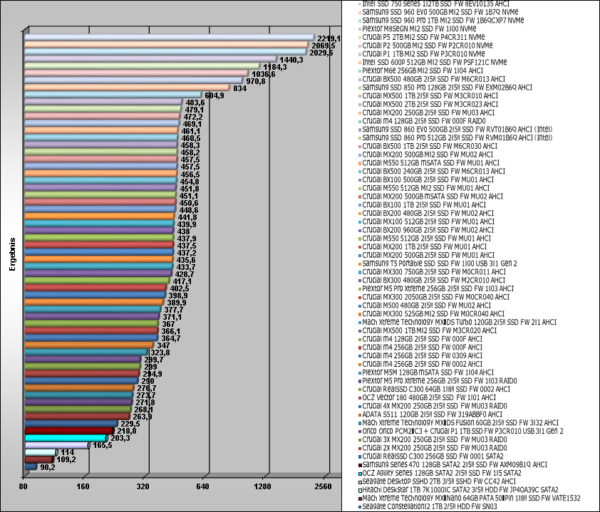
SiSoftware Sandra benchmark result …
Of course, SiSoftware Sandra benchmark should not be missing in this test series. SiSoftware offers with their SiSoft Sandra program a very comprehensive tool, which contains a lot of tools to get very reliable test results of all hardware components.
The average access time of the Intel SSD 750 1.2TB PCIe SSD is extremely low in SiSoftware Sandra with 6us and has a drive idex of 3 GB/s – that we have not reached even with SSD RAID constellations!
Here is a Snipping screenshot of the SiSoftware Sandra benchmark read values:

In the write performance measurement, the average access time of the Intel SSD 750 1.2 TB SSD in SiSoftware Sandra is at extremely low 6us and the drive index reached amazing 1.28 GB/s.
Here is a Snipping screenshot of the SiSoftware Sandra benchmark write values:

Also in SiSoftware Sandra, the Intel SSD 750 1.2TB PCIe SSD reached clearly the top of all currently tested SSDs.
Here is a comparison of the SiSoftware Sandra benchmark values, which are getting updated with soon coming drives:
